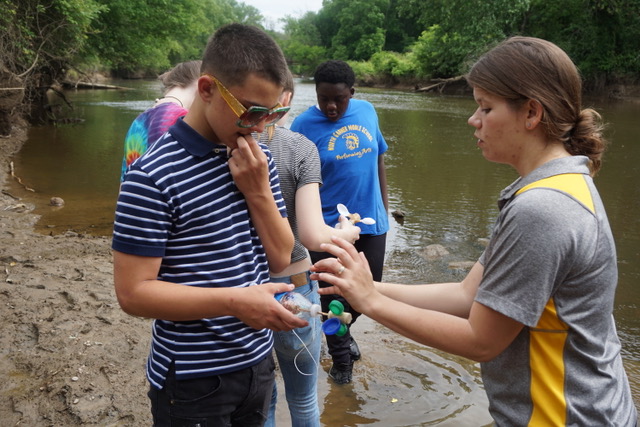Media Advisory: North Garner middle school students get out of the classroom and into the water
May 7, 2019
On Friday, May 10, eighty middle school students from North Garner Middle School in Wake County will head to the Neuse River to test water turbines they constructed in the classroom from garbage, plastic water bottles, milk jugs, wine corks and other scrap materials.
The students, who are learning about hydropower, will convene at Anderson Pointe Park from 9:30 a.m.-12:30 p.m. and use the current of the river to test the design of their turbines based their ability to generate electricity.
The science teacher behind this activity is Annie Lee, whose teaching style brings hands-on and relevant learning experiences to her students. Lee was inspired by Paul Gantt, an engineering teacher and Project Lead the Way Coordinator for Burke County Schools, a colleague she met during her participation in UNC-Chapel Hill’s NC Energy Literacy Fellows Program in 2018.
From Gantt, Lee heard first-hand about the value of letting students experience the engineering design process as a way to promote meaningful learning opportunities. This means letting students take the lead, make mistakes and learn science content through discovery, not by replicating someone else’s model.
“One goal of the NC Energy Literacy Fellows Program is to cultivate a community of middle and high school science, engineering and technology teachers who become statewide leaders when it comes to energy education. This year-long program provides opportunities for teachers from across the state to connect and learn from one another and this story is a great example of the kinds of outcomes we hope will emerge from this program, now in its third year,” says Program Director Dana Haine.
Lee recalls being inspired by Gantt during the program as he described challenging his students to capture the power of water “junkyard style” by allowing them to design and build a mechanism that would capture some of the Catawba River flow and convert it into electricity.
“Based off of the river turbine Paul’s students created, I thought if high school students can do this, certainly middle school students can as well. Our school is situated 15 minutes from downtown Raleigh, close to the Neuse River and with conversations of the population boom in the Triangle being ever present I thought this was an opportunity for my students to see sustainable technology at work. Paul encouraged me that nothing needs to be fancy and coached me in letting go of control and learning alongside my students, diving in with them to coach them, as opposed to explicitly directing their work,” says Lee.
Lee says that this design process has given her students an appreciation for the potential utility of every day “trash” items.
“Some students are going as far as to engineer, design, and build their own generators by hand coiling their copper wiring and magnet placement for optimal electricity generation. Other students are opting to purchase a small motor from a craft store and focus their engineering efforts on the turbine and housing compartment. This approach allows students to push themselves where they want to and be challenged in ways that the students still feel they can be successful and all while learning the science content of energy generation, natural resources and a review of the water cycle.” says Lee.
“We are all very excited and a bit anxious about these little hydroelectric generators. Regardless of whether these generators are a success or not. These students will walk away from the Neuse River with an educational experience and depth of knowledge that should empower them and help them feel more confident,” says Lee. “Confident that they have the power to innovate and address the environmental crisis their generation is inheriting.”
Media contacts: Annie Lee, North Garner Middle School, aclee@wcpss.net, (919) 614-7008, Dana Haine, NC Energy Literacy Fellows Program Director, dhaine@unc.edu, (919) 843-5735, Emily Williams, UNC Institute for the Environment Communications, emilywilliams@unc.edu, (919) 962-0965.
The NC Energy Literacy Fellows Program is a year-long teacher professional development experience for grades 8-12 science, engineering and technology teachers sponsored by the UNC Institute for the Environment’s Center for Public Engagement with Science with funding from the Duke Energy Foundation. https://ie-old.sites.unc.edu/energy-literacy-fellows-program/
